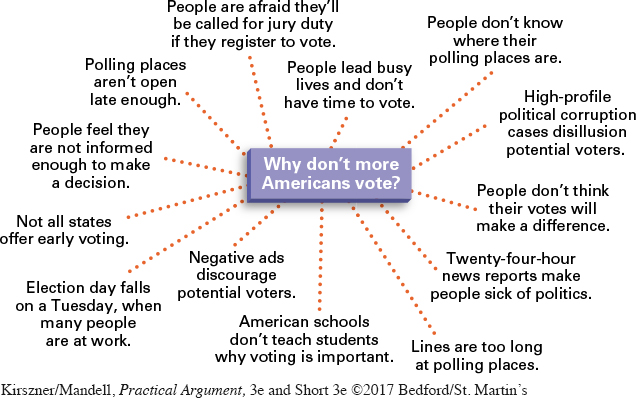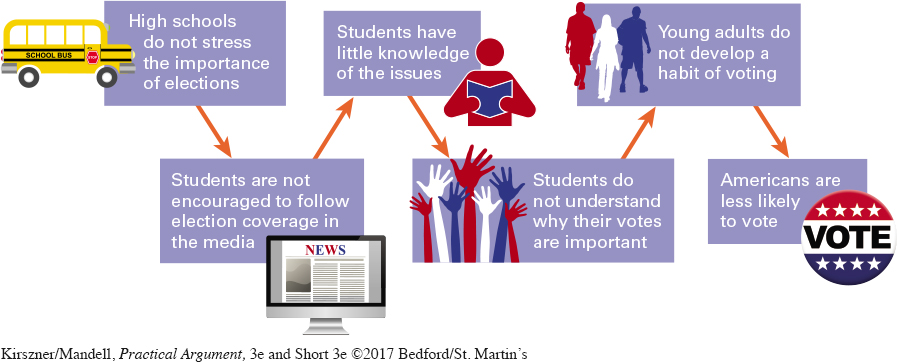Understanding Cause-and-Effect Relationships
Before you can write a cause-

Page 472
Main and Contributory Causes
In a cause-
The most important cause is the main cause; the less important causes are contributory causes. Typically, you will present the main cause as your key argument in support of your thesis, and you will identify the contributory causes elsewhere in your argument. (You may also identify factors that are not causes and explain why they are not.)
Identifying the main cause is not always easy; the most important cause may not always be the most obvious one. However, you need to figure out which cause is most important so you can structure and support your essay with this emphasis in mind.
EXERCISE 13.3
Look at the voting diagram above. Which causes do you see as the most and least important? Why? Do you think that any of the factors presented in the diagram are not really causes? Can you suggest any additional causes? If you were writing a cause-
Immediate and Remote Causes
As mentioned earlier, identifying the main cause of a particular effect can be difficult because the most important cause is not necessarily the most obvious one. Usually, the most obvious cause is the immediate cause—the one that occurs right before an event. For example, a political scandal that erupts the day before an election might cause many disillusioned voters to stay home from the polls. However, this immediate cause, although it is the most obvious, may be less important than one or more remote causes—factors that occurred further in the past but may have had a greater impact.
EXERCISE 13.4
Look once more at the diagram above. Which causes do you consider remote causes? Which one might be the immediate cause?
Causal Chains
A causal chain is a sequence of events in which one event causes the next, which in turn causes the next, and so on. For example, the problem of Americans who do not vote can be presented as a causal chain.
Page 473

When you write a cause-
Thesis statement: Because they do not encourage students to see voting as a civic duty, U.S. high schools are at least partly to blame for the low turnout in many elections.
High schools do not stress the importance of elections.
As a result, students do not follow election coverage in the media.
Because they do not follow election coverage, students have little knowledge of the issues.
With little knowledge of the issues, students do not understand that it is important to vote.
Because they do not see voting as important, young adults do not develop a habit of regular voting.
As a result, American adults are less likely to vote.
KEY WORDS FOR CAUSE-AND-EFFECT ARGUMENTS
When you write cause-
| bring about | create | lead to | encourage |
| influence | contribute to | originate in | cause |
Be sure to use transitional words and phrases such as consequently and as a result to help readers follow your argument. You should also try to repeat words like cause, effect, outcome, and result to help identify individual causes and effects.
Page 474
EXERCISE 13.5
Fill in the templates to create a causal chain for each of these sequences:
Restaurants should be required to list fat and calorie content on their menus. If they do so, _____________________. As a result, __________________________. Eventually, __________________________________.
Abstinence programs should be instituted in high schools. One immediate result would be _____________________. This could bring about _____________________. This in turn might lead to _____________________. Ideally, the result would be _________________________.
Taxes on cigarettes should be raised. If this step is taken, the first result would be _____________________. This might encourage _____________________. In a few years’ time, the outcome might be _____________________.
Post Hoc Reasoning
Post hoc reasoning is the incorrect assumption that because an event precedes another event, it has caused that event. For example, you may notice that few of your friends voted in a recent election, and you may realize that many of your friends had previously decided to become science majors. This does not mean, of course, that their decision to choose careers in science has made them nonvoters. In fact, a scientist can be very interested in electoral politics. As you develop your cause-